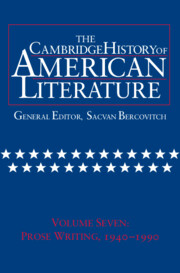Book contents
- Frontmatter
- Introduction
- The Drama, 1940—1990
- Fiction and Society, 1940–1970
- After the Southern Renascence
- Postmodern Fictions, 1960–1990
- 1 Rethinking Postmodernism
- 2 Fables of the Fetish
- 3 The End of Traditionalism
- 4 Women’s Fiction: The Rewriting of History
- 5 Conclusion
- Emergent Literatures
- Appendix: Biographies
- Chronology, 1940–1990
- Bibliography
- Index
2 - Fables of the Fetish
from Postmodern Fictions, 1960–1990
Published online by Cambridge University Press: 28 March 2008
- Frontmatter
- Introduction
- The Drama, 1940—1990
- Fiction and Society, 1940–1970
- After the Southern Renascence
- Postmodern Fictions, 1960–1990
- 1 Rethinking Postmodernism
- 2 Fables of the Fetish
- 3 The End of Traditionalism
- 4 Women’s Fiction: The Rewriting of History
- 5 Conclusion
- Emergent Literatures
- Appendix: Biographies
- Chronology, 1940–1990
- Bibliography
- Index
Summary
In 1970, The writing disease had been diagnosed as exhaustion, and practitioners were busily at work to find a cure. One approach was to analyze the condition itself, to explore the various symptoms and subtleties of the postmodern state. The “High Postmodernism” usually identified with Thomas Pynchon, John Barth, John Hawkes, Donald Barthelme, and Kurt Vonnegut was the result, and the investigations of these writers in many respects coincided. What was wrong with the novel, they concluded, was its rootedness in modernism, an ideology that fetishizes the work of art. A revitalized novel would be a novel written and received not as a neurotic fetish à la Freud or a commodified fetish à la Marx but as an opening, a doorway to communication.
The use of fetish here is prompted by postmodern novelists themselves, several of whom refer specifically to the formulations of the term in Freud or, less directly, in Marx. Marx took the term fetish from religion, where it refers to a statue or other cult object to which believers attribute the same powers as those of the spirits that the fetish object represents. Accordingly, Marx characterized the commodity fetish as a bourgeois attempt to make a religion out of mere material objects, noting the peculiar fact that we speak and act as if commodities “had” value. In the commodity, “the social character of men’s labour appears to them as an objective character stamped upon the product of that labour.”
- Type
- Chapter
- Information
- The Cambridge History of American Literature , pp. 451 - 478Publisher: Cambridge University PressPrint publication year: 1999

